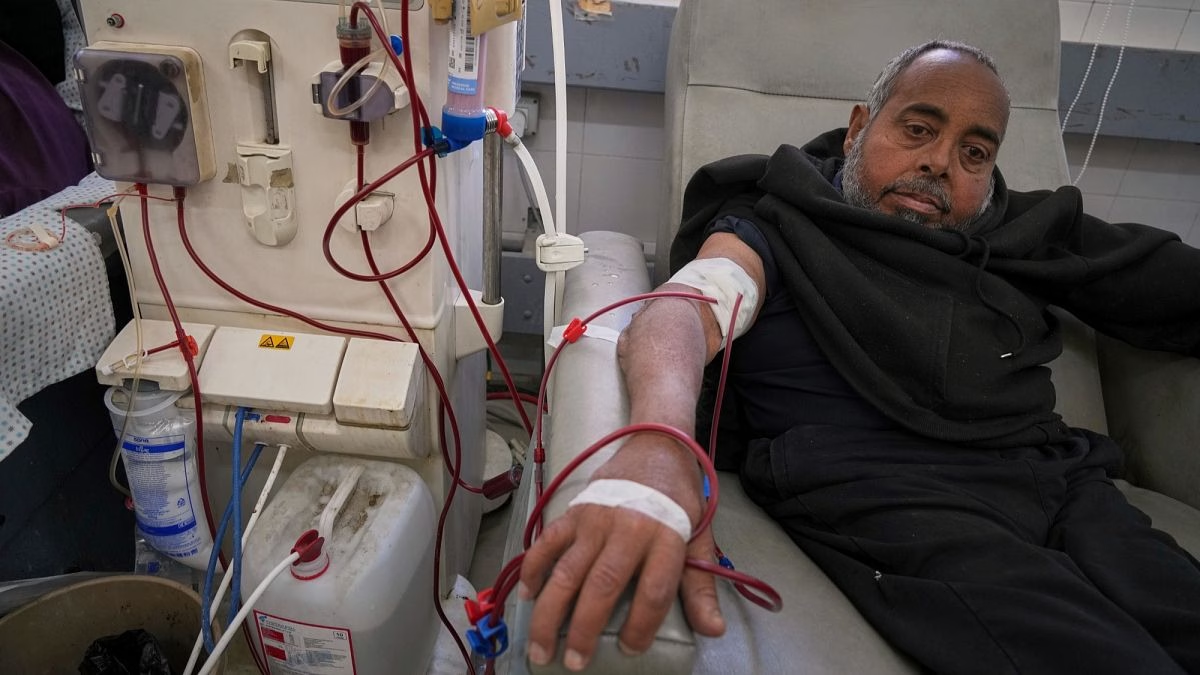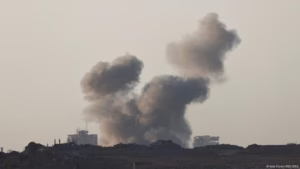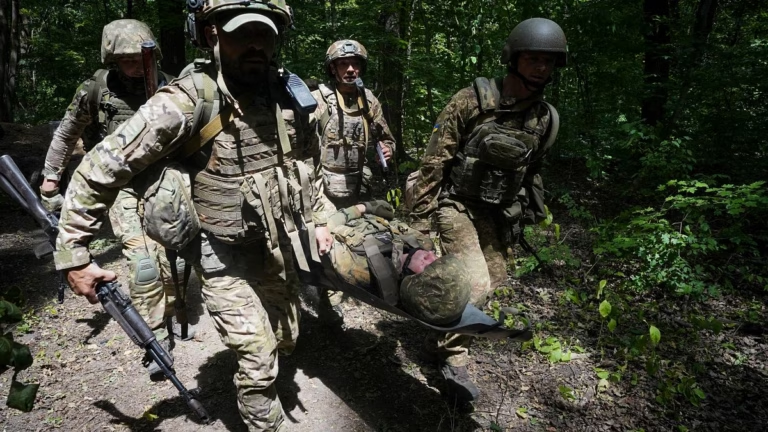<div style="--widget_related_list_trans: 'Related';">
<div class="c-ad c-ad-halfpage u-show-for-mobile-only">
<div class="c-ad__placeholder">
<img class="c-ad__placeholder__logo" src="https://static.euronews.com/website/images/logos/logo-euronews-grey-6-180x22.svg" width="180" height="22" alt="" loading="lazy"/>
<span>ADVERTISEMENT</span>
</div>
</div>
Every week, Mohamed Attiya's wheelchair rattles as he travels across the badly damaged roads in Gaza to visit the machine vital for keeping him alive.
The 54-year-old resident of a temporary shelter located west of Gaza City makes his way to Shifa Hospital in the city's north for dialysis, a treatment he was diagnosed to need 14 years ago due to kidney failure.
<div class="c-ad c-ad-sticky-floor c-advertising-sticky-floor sales-advertising-sticky-floor u-hide-for-desktop">
<button class="c-ad__btn-close" type="button" onclick="this.parentElement.classList.add('u-hide-for-all')">
<img src="https://static.euronews.com/website/images/icons/icon-cross-10x10-grey-6.svg" width="10" height="10" alt="Close advertising" fetchpriority="high" loading="lazy"/>
</button>
</div>
However, the ongoing war has severely restricted his treatment sessions, which are now limited to two or three hours at most each week despite his need for three four-hour sessions.
"It's a lifesaver," described Attiya, a father of six.
Similar fate has befallen many others, unnoticed deaths from the war, without any blasts or rubble, but resulting in a significant number: over 400 patients, around 40% of all dialysis cases in the territory, have died due to inadequate treatment during the 18-month-long conflict, as reported by Gaza's Health Ministry.
Additionally, according to the Health Ministry, 11 patients have died since March, when Israel imposed a blockade on Gaza's 2 million Palestinians, restricting food, medical supplies, and fuel.
<strong>Israeli officials</strong> claim this is to pressure Hamas into releasing more hostages after the ceasefire ended.
<p>COGAT, the Israeli military body responsible for aid coordination, declined comments on the current blockade. They have previously stated their approval for all medical aid when border crossings are open, acknowledging that about 45,400 tons of medical equipment has entered Gaza since the start of the conflict.
</p>
<h2>Gaza Patients Face Hardships</h2>
Attiya, displaced at least six times since the start of the war, is in dire need of at least three four-hour dialysis sessions weekly. However, he currently only receives two sessions, each lasting no more than three hours.
Israel's blockade and frequent evacuation orders across the region have made his consistent medical care challenging.
Attiya walked to the hospital for dialysis until recently. But he claims the insufficient treatment and the skyrocketing cost of the mineral water he should be consuming have left him bedridden in a wheelchair.
His family maneuvers him through a Gaza that is barely recognizable due to widespread destruction.
"There's no transportation; the streets are damaged," Attiya lamented. "Life is tough and expensive."
He reports now experiencing hallucinations due to high blood toxin levels.
"The occupation does not care about the suffering or the sick,” he said, referring to Israel and its military.
<h2>A Health System Destroyed by War</h2>
The World Health Organization (WHO) has reported that six out of seven dialysis centers in Gaza have been destroyed during the war, with 182 dialysis machines initially available now reduced to 102.
The WHO adds that the shortage of these machines is compounded by a lack of kidney medications.
Israel has conducted several hospital raids during the war, accusing Hamas of using them for military activities. Hospital staff deny these allegations, stating that the raids have significantly damaged the health care system, which is struggling to handle the sheer volume of war casualties.
The Health Ministry claims that <strong>over 51,000 Palestinians</strong> have been killed in Israel's military operations, without specifying the number of civilians or combatants.
Hamas-led militants killed about 1,200 individuals, mostly civilians, and abducted 251 during their October 7, 2023, attack that sparked the war.
<h2>Official Statistics on Patient Deaths</h2>
At Shifa Hospital, Dr Ghazi al-Yazigi, who oversees the nephrology and dialysis department, reports that at least 417 patients with kidney failure have perished in Gaza due to inadequate treatment during the war.
This is out of the 1,100 patients at the beginning of the conflict.
Like Attiya, numerous dialysis patients across Gaza are now restricted to fewer and shorter sessions weekly.
"This results in complications such as increased toxin levels and fluid build-up… which can be fatal," Dr. al-Yazigi stated.
Mohamed Kamel, a new dialysis patient at Shifa Hospital diagnosed with kidney failure during the war and initiated treatment this year, shares his plight.
"I don't feel any better after each session," Kamel said during one of his regular visits.
The father of six explains that he no longer has access to clean drinking water, and even basic water supply is scarce.
Last month, Israel cut off the power supply to Gaza, affecting a desalination plant that provided drinking water to parts of the arid region.
Kamel admits missing numerous dialysis sessions. Last year, while taking shelter in central Gaza, he missed one session because of an Israeli bombing in the vicinity. His condition worsened, and the following day, he was transported by ambulance to Al-Aqsa Martyrs Hospital.
"The displacement has taken a toll. I'm exhausted," Kamel commented.
</div>
Source: https://www.euronews.com/health/2025/04/23/hundreds-of-gazas-kidney-failure-patients-die-from-lack-of-dialysis-in-blockaded-territory
Like this:
Like Loading...





